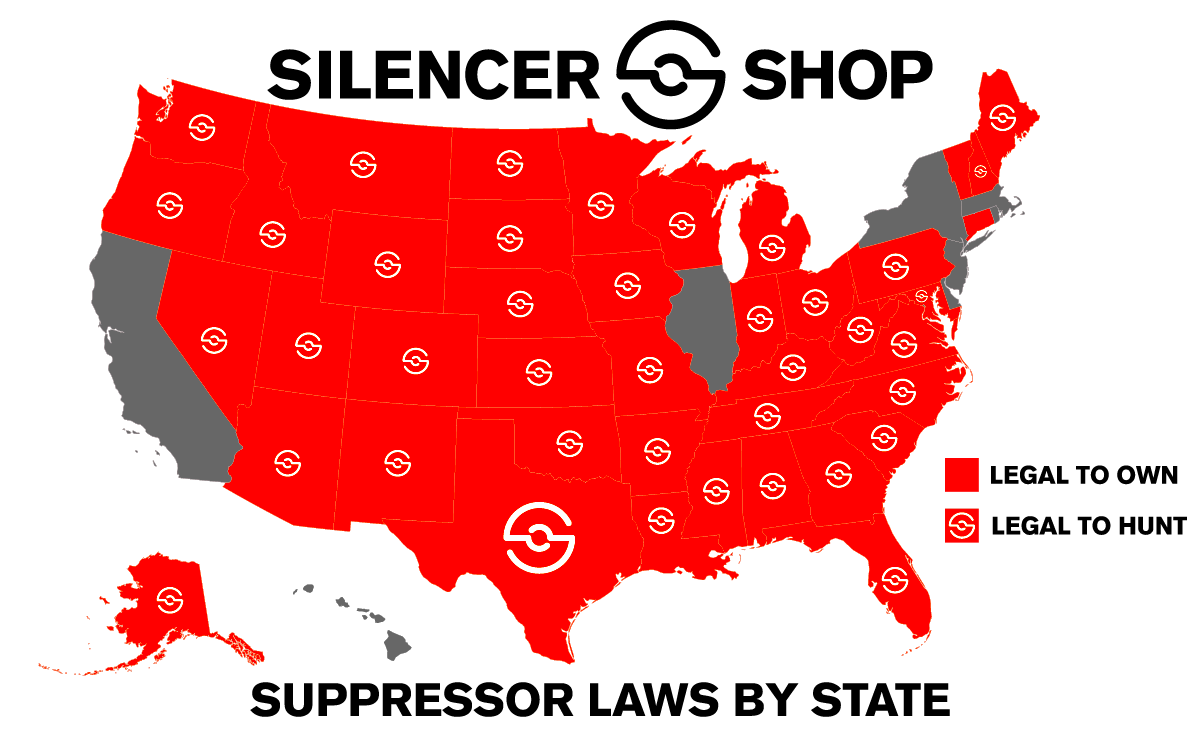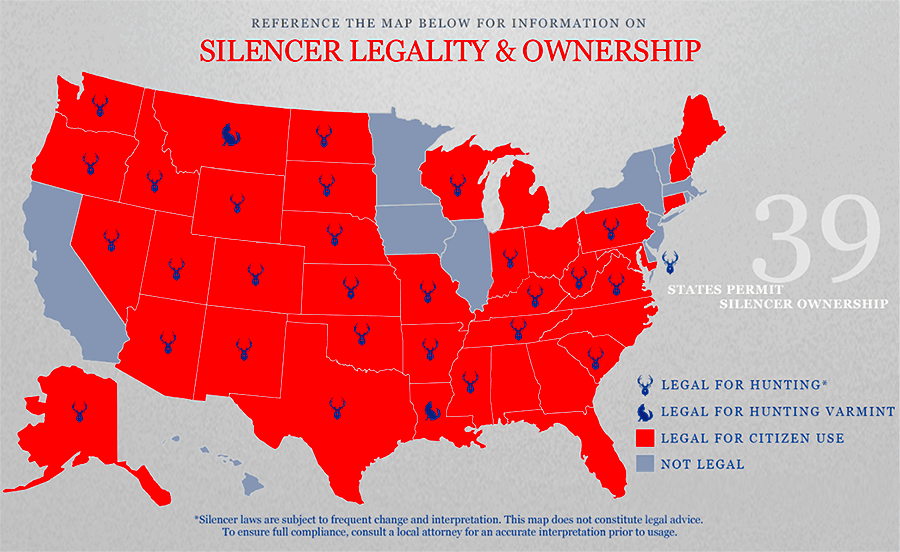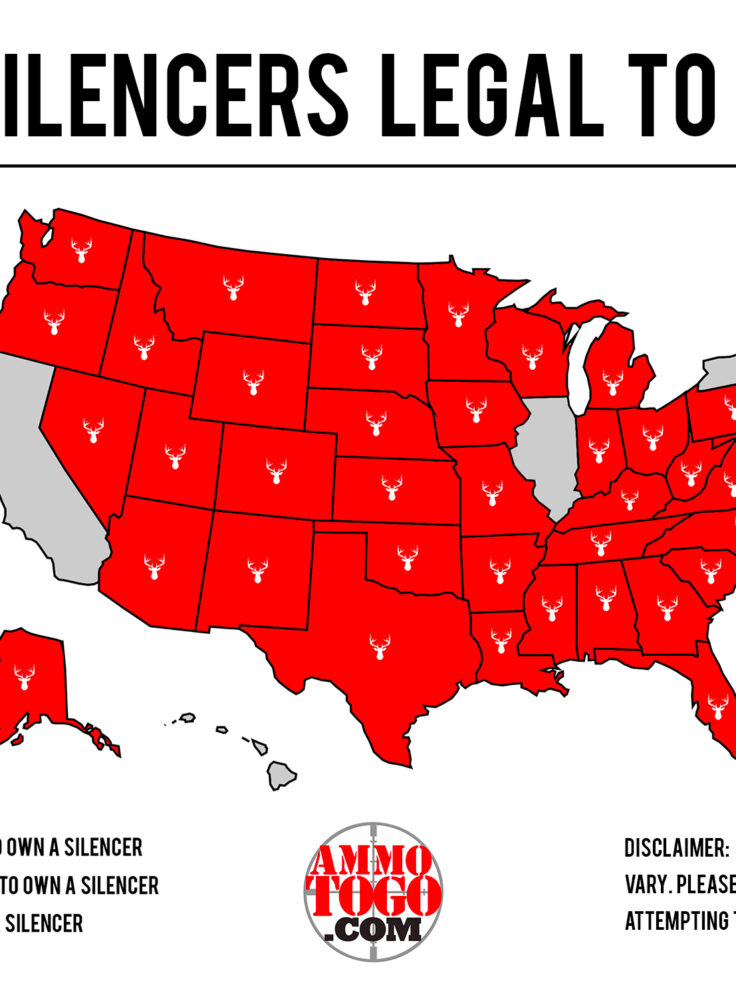Arkansas Silencer Laws and Legal Considerations
Silencers, often referred to as suppressors, are devices attached to firearms to reduce the noise produced when they are fired. While many people associate them with movies and crime scenes, they have legitimate uses in various contexts. Understanding how they work and why people use them can help demystify their role in the firearms community.
Here are a few common uses of silencers:
- Noise Reduction: Silencers help lower the sound of gunshots, making shooting more pleasant for both the shooter and bystanders.
- Hearing Protection: By reducing noise levels, they can help prevent hearing damage, especially for those who frequently use firearms.
- Wildlife Management: In hunting and farming, silencers can reduce disturbance to animals and neighbors.
However, it’s important to note that while they reduce noise, silencers do not make firearms silent. The term “silencer” can be misleading, as the primary function is sound suppression rather than complete silence.
Overview of Arkansas Silencer Laws

In Arkansas, the laws surrounding silencers are quite specific and reflect a balance between gun rights and public safety. Understanding these laws is essential for any gun owner or enthusiast.
According to Arkansas law:
- Silencers are legal to possess and use, provided they comply with federal regulations.
- They must be registered with the Bureau of Alcohol, Tobacco, Firearms and Explosives (ATF).
- State laws do not impose additional restrictions beyond federal regulations.
This legal framework aims to ensure responsible ownership while allowing individuals to enjoy the benefits of using silencers. It’s crucial for owners to stay informed about any changes in legislation.
Legal Requirements for Purchasing a Silencer

To legally purchase a silencer in Arkansas, prospective buyers must navigate both state and federal laws. The process involves several steps to ensure compliance and safety.
Here’s what you need to know:
- Eligibility: Buyers must be at least 21 years old and legally eligible to own a firearm.
- Application Process: Submit a Form 4 to the ATF, which requires information about the buyer and the silencer.
- Background Check: A thorough background check will be conducted by the ATF as part of the application process.
- Payment of Tax: There is a one-time $200 tax for the transfer of the silencer, which must be paid during the application process.
- Approval Waiting Period: After submission, applicants must wait for the ATF to process the application, which can take several months.
Once approved, buyers can purchase and possess the silencer legally. It’s essential to retain all documentation related to the purchase for future reference.
How to Legally Possess a Silencer in Arkansas

Owning a silencer in Arkansas can be straightforward if you follow the right steps. Understanding the legal process helps ensure that you stay compliant while enjoying your rights as a gun owner. Here’s a simple guide to help you navigate through the ownership process.
To legally possess a silencer, you need to:
- Complete the ATF Form 4: This is the application for the tax stamp that allows you to own a silencer. You’ll need to provide personal details and information about the silencer.
- Get Fingerprinted: You will need to get fingerprinted and submit a set of your fingerprints along with your application. This step is crucial for the background check.
- Obtain a Photograph: Include a recent passport-style photo with your application. This helps in verifying your identity.
- Pay the Transfer Tax: You’ll need to include a check or money order for the $200 tax required for the transfer of the silencer.
- Submit the Application: Once you have everything ready, submit your completed application to the ATF and wait for their approval.
After receiving approval, you can legally purchase and possess your silencer. Remember, maintaining compliance with federal and state laws is key to enjoying your rights responsibly.
Potential Penalties for Violating Silencer Laws
Understanding the potential penalties for violating silencer laws in Arkansas is essential for all firearm owners. Ignorance of the law is not an excuse, and the consequences can be severe. Let’s break down the possible violations and their penalties.
Here are some common violations:
- Possession without a Tax Stamp: If you own a silencer without proper registration, you could face felony charges, which may result in fines and imprisonment.
- Illegal Transfer: Selling or giving away a silencer without going through the proper legal channels can lead to criminal charges, including hefty fines.
- Failure to Submit Documentation: Not keeping the necessary paperwork can complicate legal ownership and may lead to confiscation.
- Use of a Silencer in Commission of a Crime: If a silencer is used during the commission of a crime, penalties can be significantly increased, leading to longer sentences.
Overall, it’s crucial to adhere to all regulations regarding silencers. The penalties can be serious, including significant fines and potential prison time, which can affect your future and reputation.
Important Considerations for Silencer Ownership
Owning a silencer comes with its own set of responsibilities and considerations. Being informed can enhance your experience and ensure you comply with the law. Here are some important aspects to keep in mind:
1. Legal Compliance: Always stay updated on federal and state laws regarding silencers. Laws can change, and being aware of these changes is crucial for compliance.
2. Responsible Usage: Silencers should be used safely and responsibly. Always practice good shooting etiquette and ensure you’re in a safe environment when using firearms.
3. Storage: Secure storage of your silencer is vital. Treat it like any other firearm and keep it locked away from unauthorized access.
4. Education: Consider taking courses or training sessions focused on silencer use and safety. Knowledge can help you handle firearms more effectively.
5. Respect for Others: Be mindful of your surroundings when using a silencer. While it reduces noise, it’s essential to respect neighbors and local communities.
By considering these factors, you can enjoy the benefits of silencer ownership while maintaining a commitment to safety and legality.
Comparing Arkansas Silencer Laws to Other States
When it comes to silencer laws, each state has its own regulations, and Arkansas is no exception. Understanding how Arkansas laws stack up against those in other states can provide valuable insights for gun owners. This comparison can help you gauge the level of restrictions or freedoms you might have as a firearm enthusiast.
Here’s a brief overview of how Arkansas compares:
- General Legality: In Arkansas, silencers are legal to own with proper registration, similar to many other states. However, some states, like California and New York, impose stricter bans or additional restrictions.
- Registration Process: Arkansas follows federal guidelines for the registration of silencers. States like Texas have similar processes, while states like New Jersey require additional permits.
- Usage Restrictions: While Arkansas allows silencer use for hunting, some states have specific regulations on when and where they can be used. For instance, Michigan has limitations on hunting with suppressors.
- Local Variations: In some states, local ordinances may impose stricter rules than state laws. Arkansas generally doesn’t have this issue, making ownership more straightforward.
Overall, Arkansas offers a relatively relaxed environment for silencer ownership compared to many other states. Being aware of these differences is essential for anyone considering purchasing a silencer.
FAQs About Silencer Laws in Arkansas
Understanding the nuances of silencer laws can be a bit overwhelming. Here are some frequently asked questions that might clarify common concerns regarding silencer ownership in Arkansas.
- Are silencers legal in Arkansas? Yes, silencers are legal to own in Arkansas, provided they are registered with the ATF.
- Do I need a special permit to own a silencer? You need to complete an ATF Form 4 and pay a $200 transfer tax to legally own a silencer.
- Can I use a silencer for hunting? Yes, silencers can be used for hunting in Arkansas, but it’s important to check specific hunting regulations.
- What happens if I get caught with an illegal silencer? Possession of an unregistered silencer can result in severe penalties, including fines and imprisonment.
- Do I need to notify anyone if I move my silencer? It’s a good practice to notify the ATF of any address changes to keep your registration information up to date.
These FAQs cover some of the most common inquiries, but always feel free to consult legal experts or local authorities for specific questions regarding silencer laws.
Conclusion and Final Thoughts
In conclusion, understanding Arkansas silencer laws is vital for any responsible gun owner. The process of obtaining and owning a silencer can be straightforward if you follow the necessary legal steps. While Arkansas has relatively relaxed laws compared to other states, it’s still essential to remain informed about your rights and responsibilities.
By being knowledgeable about the legal requirements, potential penalties for violations, and important considerations for ownership, you can enjoy the benefits of owning a silencer responsibly. Always prioritize safety and compliance to make your shooting experience enjoyable and legal. Whether you’re a seasoned gun owner or a newcomer, staying informed is your best tool for navigating the complexities of silencer ownership.

